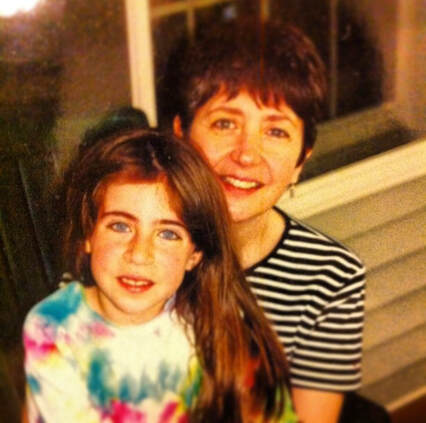|
"Full Cup" by Katrina Erni
I’ll never forget sitting in the large room of the ICU, surrounded by nurses and neurosurgeons as they told us the devastating news. My mom had been diagnosed with a rare and aggressive form of brain cancer following emergency surgery for an aneurysm she had suffered a few days before. I remember my aunt and my mom’s oncologist putting their arms around either side of me. When we heard that the test results were in, I had offered to take notes - instead, I choked back tears as they explained that my mom’s life expectancy was somewhere between 1 and 5 years. The walk back to my car later that night was one of the most surreal experiences of my life. This was January of 2016 and my mom passed away just over two years later. Those two years were incredibly difficult. The bad days were super rough, and the good days were tinged with a new, bittersweet feeling that colored everything. The long, slow loss of someone who you love more than anything, watching them struggle and decline, is indescribable. I began to struggle with anxiety and depression and felt scatterbrained and flaky for the first time in my life. During this time, maybe a year or so into my mom’s diagnosis, I began talking to a therapist. Sometimes I would talk about my mom. Sometimes about my love life. A lot of the time, I just complained about work. One of the most helpful things she told me is that when your cup is already full, adding the smallest additional drop can cause it to overflow. My anxiety would usually spiral over something relatively small - a mistake at work, a friend forgetting to text me back - but those small things could cause an emotional flood given everything else I was dealing with. After my mom passed away, I had amazing support from family and friends but I continued to struggle with my mental health. Racing thoughts, paralysis from fear of being anything less than perfect, and crying myself to sleep more often than I’d like to admit are just a few examples. Therapy helped in the short term but didn’t seem to move the needle overall. Finally, I went to see a psychiatrist - the same psychiatrist who had treated my mom - and she prescribed antidepressants in late 2019. This was a huge breakthrough for me. I didn’t stop feeling sad about my mom, my grief didn’t go away, but the weight of all those things that I had been carrying lifted somewhat. My mind stopped racing and I stopped feeling so alone. Medication certainly isn’t for everyone but for the year and a half that I was on it, my SSRI helped me bridge the wide gap between grief that felt like it was spiraling out of control to grief that is now perfectly manageable. Telling people that it gets easier is a cliche for a reason. I miss my mom all the time, but it doesn’t get in the way of my life or my wellbeing. My memories of my mom no longer revolve around her illness. I think more and more about the fun we used to have and it brings a smile to my face instead of tears to my eyes. Nowadays, I can talk about my mom, even her illness and death, without getting a lump in my throat. For anyone reading this who is struggling with their mental health after losing a parent, I’m here to tell you to seek help if you need it - lean into your support network, whether that’s friends and family or an amazing organization like Circle, talk to a therapist, and consider working with a psychiatrist if you feel like you need that extra push. All three of those things, over time, helped me emerge from a very difficult period and allowed me to start living a life that I love.
0 Comments
Leave a Reply. |
The Circle BlogWhere people in our community can come together and talk about their grief. Archives
May 2022
Categories |
Circle Camps is a 501(c)(3) organization incorporated in 2002 in the Commonwealth of Pennsylvania
Circle Camps is also registered as a foreign non-profit organization in 2020 in the State of Georgia. Circle Camps is also registered as a foreign non-profit organization in 2023 in the State of Wisconsin.
Privacy policy - Cookie policy
Circle Camps is also registered as a foreign non-profit organization in 2020 in the State of Georgia. Circle Camps is also registered as a foreign non-profit organization in 2023 in the State of Wisconsin.
Privacy policy - Cookie policy


 RSS Feed
RSS Feed